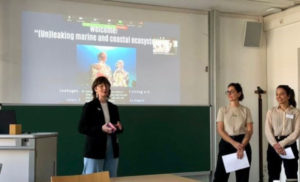For four days, researchers in Science and Technology Studies (STS) and adjacent fields came together to discuss on politics, techno-scientific imaginaries and environmental entanglements of what may count as “leakage, leaky, or leaking”.

Tanja Bogusz, Ramona Hägele and Nane Pelke (from left to right) at the Panel “(Un)leaking marine and coastal ecosystems” (credits: Irina Rafliana, IDOS).
The discussions took place as part of the inaugural conference of stsing titled “Leakage”, held from 19 to 22 March at the Technische Universität Dresden (TU Dresden). Ramona Haegele, researcher and PhD Candidate at IDOS, chaired a panel on “Feminist STS meets Artistic Research”, in which three female artists presented their work on artistic and scientific practices, processes of alienation, material and non-material entanglements, infrastructural failure, and greenwashing by using examples of a geothermal power plant in Iceland, flows of water, cells, and menstrual blood in hybrid art, and a floating radio vessel moving through urban river spaces.
Moreover, together with Tanja Bogusz and Nane Pelke (both University of Hamburg), she chaired a panel on “(Un)leaking marine and coastal ecosystems”. This interdisciplinary panel explored the complex and dynamic interactions between sea, science, technology, society, and marine and coastal ecosystems. The panelists thus presented and discussed a wave simulator in Brazil, climate modelling in coastal communities in Ghana and knowledge practices of an intergovernmental marine science organisation.
Irina Rafliana, researcher and PhD Candidate at IDOS, presented her research titled “When Uncertainties Seep Into Trading Zones: Tsunami Warning System Technologies” on a panel on “States of Emergency and Technological Sensing”. She thereby looked at tsunami modelling and forecasting and involved diverse scientific disciplines and (geo)political interests, which are often entangled, hence establishing ‘trading zones’ to exchange and negotiate trade-offs of what modeling could and could not offer as an effort to reduce tsunami risks.
If you are interested in marine Science and Technology Studies, join the marine STS working group of stsing e.V. The stsing (read as: STS-ing) association (Verein), was established in 2020 with a growing number of members. The association values not only the exchanges of interdisciplinary research in socially embeddedness of science and technologies, but also good labor relations in STS practices and shared accountabilities.
